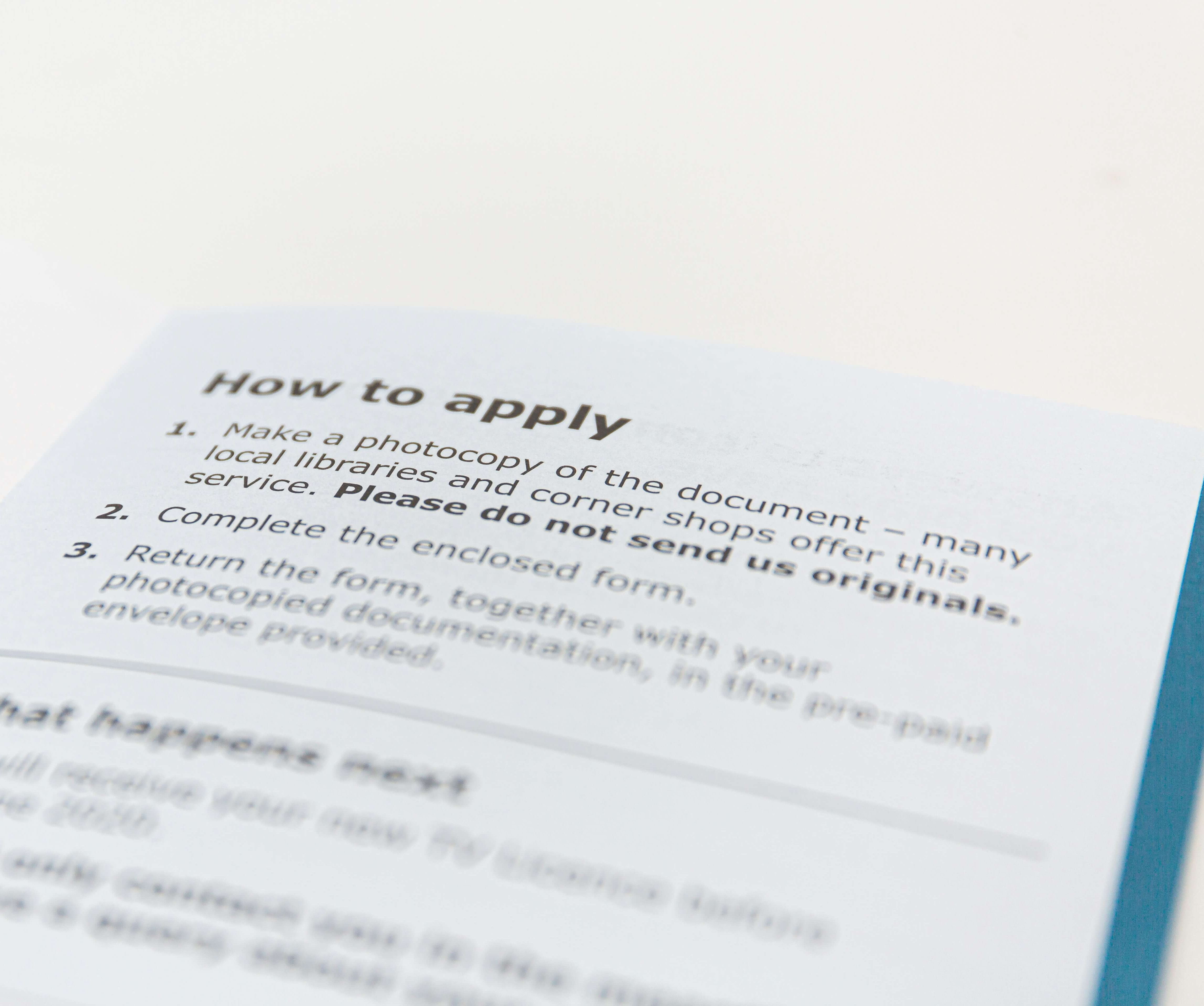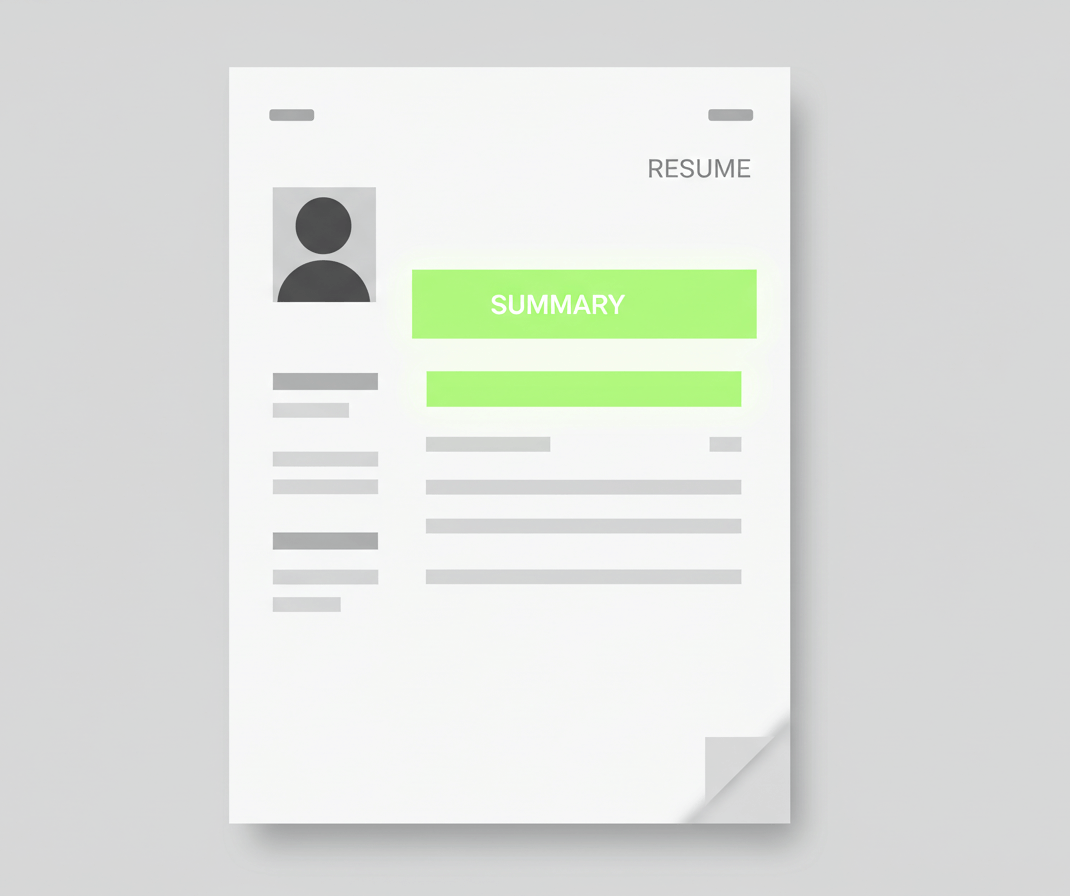"I'm currently a 17 yr old in high-school and I'm trying to get a job. I know if you don't have work experience you can put other types of experiences so what do I put down?"
Starting your job search with no formal work experience can feel like trying to solve a puzzle with half the pieces missing. But here’s the good news: a solid resume summary can fill in those gaps and show employers what you do bring to the table. Whether you’re a student, a recent grad, or switching careers, this guide will walk you through creating a resume summary that highlights your strengths—no experience required. You’ll get step-by-step tips, 15+ real examples, and practical advice to make your resume pop.

Why You Need a Resume Summary (Even Without Experience)
A resume summary is that short blurb at the top of your resume—usually 2–3 sentences—where you pitch yourself to the hiring manager. It’s like the trailer for a movie: it needs to grab attention and hint at the good stuff to come. For someone without work history, it’s a golden opportunity to shine.
Here’s why it matters:
- It shows employers you’ve got potential, even if you haven’t punched a timecard yet. Enthusiasm and a willingness to learn go a long way.
- It lets you play up skills you’ve picked up from school, volunteering, or life—stuff that’s relevant to the job.
- It helps you stand out. Most entry-level candidates skip this part or leave it generic. A strong summary says, “I’m worth a closer look.”
No experience doesn’t mean no value. A good summary proves that to the person holding your resume.
What to Include in a Resume Summary with No Experience
When you don’t have any formal job experience, writing a resume summary might feel tricky. But it’s absolutely possible—and even smart—to write one that gets attention. Instead of work history, you’ll highlight what you do bring to the table. That includes your education, transferable skills, unpaid experiences, and a clear interest in the role or industry. Here's how to shape a strong summary for a resume with no experience, using four key areas.
Educational Background
If you’re just starting your career, your education is your biggest asset. It shows commitment, knowledge, and effort. In your resume summary, include:
- The name of your degree, diploma, or certification. If you're still studying, mention your expected graduation date.
- Your GPA—if it’s 3.0 or higher. This signals you're a solid student.
- Courses, class projects, or academic awards that relate to the job.
Think about what you studied and how it connects to the position. For example, applying for a marketing internship? Mention that branding project you worked on in class. Applying for a tech job? Highlight a coding course or the time you built a website for a class assignment. Just keep it relevant—your gym or pottery electives don’t belong here.
Transferable Skills
Transferable skills are abilities that work well in many situations—not just at a job. You might have picked them up at school, during group projects, through hobbies, or even while helping at home. They show you're capable of handling responsibilities, even if they weren’t part of a paycheck.
Break them into two types:
- Hard skills – These are technical or teachable. Examples include Excel, Photoshop, Google Docs, video editing, HTML, or using social media platforms for projects.
- Soft skills – These are more personal and relate to how you interact or work. Think: communication, leadership, organization, problem-solving, time management, or working under pressure.
For instance, maybe you led a school debate team, coordinated a group project, or managed schedules during a club event. All of these show initiative and reliability—qualities any employer wants.
Internships, Volunteering, or Extracurriculars
No formal job? No problem. Unpaid experience still counts—and sometimes it shows more initiative than a part-time job.
Include any of the following:
- Internships, even if they were only a few weeks long or unpaid. They still reflect exposure to a work setting.
- Volunteer experience, such as tutoring, fundraising, event planning, or helping out at a non-profit or community center.
- Extracurriculars, like clubs, student council, or sports teams—especially if you held a leadership position or helped organize something.
The key is to focus on what you did and what you learned. Did you organize events? Coordinate with teammates? Raise money or promote activities on social media? These all demonstrate real skills like communication, leadership, and responsibility.
Career Goals or Passion for the Role
Your resume summary is also a great place to express interest in the industry or job you’re applying for. Employers want to know you’re motivated—not just blindly applying to anything.
Here’s what to add:
- A short line about your long-term career direction. Keep it general but aligned with the job. For example, “Interested in a career in healthcare communication” works better than “Trying to figure out my path.”
- A sentence about why you care about this field. It could be a personal connection, a class that inspired you, or a project that sparked your interest.
You don’t need to sound over-the-top, but showing real interest helps you stand out. A little genuine enthusiasm goes a long way.
How to Write a Resume Summary with No Experience: Step-by-Step
Writing your summary doesn’t need to be complicated. Once you know what to focus on, it’s just a matter of putting the pieces together. Here’s a step-by-step breakdown to help you craft a strong summary for resume with no experience examples in mind:
Step 1: Start with a Label
Your first line should quickly say who you are. Use a short label that gives a snapshot of your background. For example:
- “Organized High School Graduate”
- “Detail-Oriented Career Starter”
- “Creative College Student with Passion for Design”
This sets the tone and tells the reader what kind of candidate you are before they dive into the details.
Step 2: Mention Your Top Skills
Pick two or three skills that directly relate to the job you’re targeting. Read the job description and match your strengths to what they need.
Instead of vague phrases like “hardworking team player,” say things like:
- “Skilled in public speaking and event coordination”
- “Proficient in Excel and data visualization tools”
- “Experienced in collaborative problem-solving and conflict resolution”
Being specific makes it easier for hiring managers to picture how you'd fit into their team.
Step 3: Add Related Experience (Volunteer, School Projects)
Support your skills with a quick mention of where you used them. This could come from class projects, extracurricular activities, internships, or volunteer work.
For example:
- “Led a team of four in a class project to build a prototype mobile app, presenting the final pitch to faculty.”
- “Organized social media promotion for a school fundraiser, increasing turnout by 40%.”
These examples show action. They’re short, real, and prove you know how to apply your skills.
Step 4: End with a Career Goal or Value Statement
Close your summary with a line that shows where you're headed or what you hope to contribute.
Keep it simple and relevant. For instance:
- “Eager to grow within a customer-focused team and contribute strong organizational skills.”
- “Excited to apply creative thinking and communication skills in a fast-paced design role.”
- “Looking to bring a positive attitude and a willingness to learn to a dynamic work environment.”
This final touch helps give your summary a sense of purpose—and makes it easier for employers to see you as a good match.
Final Tip
When building a summary for resume with no experience, aim to keep it honest, focused, and short—around 3–4 sentences is enough. It's about showing who you are, not who you think they want you to be.
Want more guidance or examples? Check out our free AI resume builder and ATS-friendly resume checker at JobHun to get started fast—even with zero experience.
Resume Summary Examples for No Experience (15+)
Writing a summary for resume with no experience can feel overwhelming, especially when you're just starting out. The key is to highlight your potential, transferable skills, and the value you can bring—even if you haven't held a formal job yet.
To help you out, here are 15 real-world resume summary examples tailored to different backgrounds and situations. They're short, practical, and easy to customize. Use these examples as a starting point, and tweak the wording to reflect your unique experiences and goals.
High School Student (Retail Job)
"Friendly high school junior with strong people skills built through planning school events. I'm eager to join a retail team where I can use my positive attitude, learn quickly on the job, and help customers feel welcome."
Why it works: This summary emphasizes communication, teamwork, and initiative—key for any entry-level retail role.
College Student (Internship)
"Organized sophomore majoring in psychology, experienced in collaborating on group projects and managing deadlines. Looking to intern in a human resources department to apply what I've learned in class to a professional setting."
Tip: Focus on soft skills like organization, communication, and responsibility when you lack formal work experience.
Career Changer with Volunteer Experience
"Dedicated community volunteer with three years of experience in event coordination, outreach, and team leadership. Ready to bring these skills into a nonprofit role where I can support causes that matter and make an impact."
Note: Even unpaid experience counts—especially if it shows leadership and commitment.
College Graduate (No Work)
"Recent biology graduate with a 3.6 GPA and hands-on research experience from university labs. Excited to begin an entry-level role where I can use my analytical thinking, attention to detail, and scientific curiosity."
Good to know: Your education is your strength. Lead with academic achievements and relevant projects.
Entry-Level IT Role
"Tech-savvy student with real-world coding practice from class projects and personal learning. Comfortable with HTML, CSS, and basic Python. Looking to join an IT team where I can grow, solve problems, and contribute early."
Advice: Mention the actual tools or languages you've used—even if you've only learned them through school.
Aspiring Data Analyst
"Detail-oriented math graduate with a strong grasp of statistics, Excel, and data visualization tools like Google Sheets. Ready to dive into data, uncover insights, and help teams make smarter decisions based on numbers."
Why it's solid: Shows analytical ability and a readiness to apply classroom knowledge in the real world.
Teaching Assistant
"Patient and dependable education major with informal tutoring experience through peer study sessions and homework support. Hoping to assist in the classroom, support student learning, and develop my teaching skills."
Pro tip: Use everyday examples—study groups, class presentations, mentoring younger students.
Customer Service
"Outgoing high school graduate with clear communication skills developed through volunteering and school presentations. Excited to start a customer service job where I can help people, stay organized, and keep things running smoothly."
Highlight: This shows confidence, reliability, and a willingness to learn—traits employers love.
Graphic Designer (Portfolio Only)
"Creative design student with a strong portfolio of digital art, branding projects, and visual layouts created using Photoshop and Canva. Eager to begin my design career in a hands-on environment that encourages growth."
Reminder: If you have a portfolio—even if it's just class or personal work—mention it clearly.
Marketing Assistant
"Media studies student with a passion for digital trends and hands-on experience running a campus club's Instagram account. Looking to support a marketing team with fresh content ideas, social media insights, and a strong work ethic."
Insider tip: Personal projects like managing social accounts or blogs can boost your resume summary.
Admin Assistant (Part-Time)
"Detail-focused college student with scheduling and record-keeping skills gained through student council work. Interested in a part-time administrative role where I can support operations and stay organized under pressure."
Note: Soft skills like organization, time management, and communication are key here.
Nonprofit Role
"Compassionate volunteer experienced in charity drives, team collaboration, and community fundraising. Hoping to contribute to a mission-driven nonprofit where I can continue making a positive difference."
Make it matter: Align your values with the job—especially for roles where passion matters.
Remote Job
"Reliable self-starter with time management skills developed through online coursework and remote group projects. Looking to join a remote-first company where I can stay productive, communicate clearly, and take ownership of my tasks."
For remote roles: Emphasize independence, focus, and digital communication skills.
Entry-Level Data Entry
"Focused and accurate high school graduate with fast typing skills and experience managing digital records for a student club. Looking for a data entry role where I can deliver precise work and stay organized."
Small detail, big impact: Fast typing, accuracy, and digital literacy are gold in data roles.
Summer Job Applicant
"Hardworking teen with a track record of responsibility from babysitting, yard work, and helping neighbors. Eager to take on a summer job where I can gain experience, show up on time, and lend a hand."
Keep it honest: No need to overhype—show you're dependable and willing to learn.
Pro Tip
If you're writing a summary for resume with no experience, focus on what you do have—whether it's volunteer work, school projects, or everyday life experiences that demonstrate reliability, enthusiasm, and potential. Be honest, keep it specific, and tailor each summary to match the job you're applying for.
Tips to Make Your Resume Summary Stand Out
If you're writing a summary for a resume with no experience, you need every word to work hard. A good summary isn’t about sounding fancy—it’s about sounding like someone worth hiring. Here's how to make yours pop.
First, match the job description. Before writing your summary, scan the job ad and pick out key words or phrases that show up more than once. If they mention “teamwork,” “attention to detail,” or “creative thinking,” try to reflect those qualities in your own words. Recruiters skim fast, so using the language they expect gives you a better chance of being noticed.
Use strong, direct language. Start sentences with active verbs like “led,” “created,” or “supported.” These instantly make you sound more capable and hands-on, even if you don’t have formal work experience yet. Instead of writing “responsible for social media,” try “managed Instagram content for a student group.”
Stay away from vague descriptions. Saying you're a “hard worker” or “motivated individual” might sound good in your head, but it doesn’t say anything specific. Give examples. Mention something you actually did—like planning a school event, running a blog, or helping organize a team project. Real actions are always more impressive than general claims.
Keep your summary short. You’re not writing a cover letter here. Two to three sentences are enough. Think of it like a short trailer for your resume. You’re giving them a quick reason to keep reading, not trying to tell your whole story in one go.
It also helps to show a bit of enthusiasm. A phrase like “excited to contribute to a fast-paced team” or “eager to apply classroom knowledge in a real-world setting” feels much more alive than a flat, robotic tone. Energy matters—even in writing.
Make sure to include something that helps you stand out. This could be a unique skill, a cool project, or even something personal that connects to the role. For example, if you built a small app for fun, or taught yourself how to use Canva for club posters, that’s worth mentioning. Employers love candidates who take initiative.
And finally, don’t forget to proofread. Typos in a resume summary can send the wrong message, especially when you're trying to make a strong first impression. Read it out loud. Fix anything clunky. If you can, have someone else look it over too.
Common Mistakes to Avoid
Some summaries fall flat—not because the person writing them isn’t capable, but because they slip into these easy-to-make mistakes.
One of the biggest is sounding too generic. Writing “Looking for a job to grow my skills” doesn’t tell the reader anything helpful. Be more specific about what you can do or what you’re excited to contribute.
Another common issue is focusing too much on yourself. It’s easy to write from the mindset of “Here’s what I want.” But your summary should really say “Here’s how I can help you.” Frame your experience, even if it’s limited, around what the employer is looking for.
And don’t ramble. You’ve got limited space and the reader’s attention is short. Cut anything that doesn’t directly add value. Stick to what matters.
Bonus: Format + Where to Place the Summary
You’ve written your summary—now where should it go? Right at the top of your resume, just below your name and contact info. This is prime real estate, and your summary is the hook.
Label it clearly with a simple heading like “Summary” or “Professional Summary.” Keep the font size a touch bigger than the body text—around 12 to 14 points is great for readability.
To make it easy to scan, break your summary into 2–3 clean lines. You can even space them like short paragraphs to avoid a bulky wall of text. The goal is to make sure it’s sharp, readable, and makes someone want to keep scrolling down your resume.
No need for fancy formatting or overthinking the design. Just a clean, confident intro that gives employers a reason to keep reading.

Conclusion
A resume summary isn’t about listing jobs you haven’t had—it’s about showing who you are and what you can do. With your education, skills, and a little enthusiasm, you can craft something that turns heads, even with no experience. You’re just starting out, and that’s exciting—let your summary show it!
Need more help? Try our resume builder for a quick start, or check out more tips on our blog. You’ve got this—go land that job!


